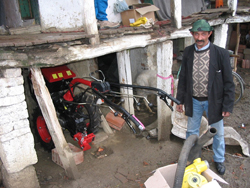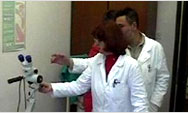You are here » Home » Telling Our Story
First Person
A Roma man from Kosovo makes a new life in Serbia
Refugee Looks to the Future

| |
Photo: Mercy Corps Serbia
|
|
Djemailj Jahiri is proud and protective of the red moto-cultivator that signaled the start of a new life in Krusevac, Serbia.
With a USAID-funded grant, Djemailj Jahiri purchased a moto-cultivator that is helping him transform a farm and even start to put aside savings.
|
The Jahiris, a Roma family of 10, escaped the Kosovo conflict in 1999. They had been living in Podujevo, Kosovo, on half a hectare of land and grew vegetables in a glass greenhouse. Djemailj worked as a carpenter. Those years now seem long ago. After the conflict broke out, they sought refuge in Krusevac, a municipality in south-central Serbia, and settled in a ruined house on a small plot of land owned by Djemailj’s brother.
The nearest source of water is a stream two kilometers from the house. To bring water for his family, greenhouse, and livestock, Djemailj would ferry it on the back of a horse, making three trips a day.
Djemailj knew he needed better access to water to grow greenhouse vegetables. The distance from the well made it impossible to build a pump, so he applied for assistance from a USAID-funded program. Using his grant to purchase a 12-horsepower moto-cultivator, he attached the vehicle to a cart with a water tank that transports four times as much water as his horse. The cart, made from scrap metal, was Djemailj’s own investment.
Instead of visiting the stream three times each day, he now goes just once. The extra time lets Djemailj devote his time to farming and transporting produce to the local market. He has also started saving a little money for the future, when he plans to develop the farm by digging his own well and raising cattle.
Serbia’s 2002 census counted 1,742 Roma in Krusevac. Most are not as fortunate as Djemailj. They live in settlements on the edge of town in barracks, makeshift shacks, and hovels made of nylon and cardboard. USAID supports 28 local projects that work to better the lives of Krusevac’s Roma community. It was through one of these projects that Djemailj Jahiri received the assistance that has given him the strength to plan for a better future.
Print-friendly version of this page (443kb - PDF)
Click here for high-res photo
Back to Top ^ | 

